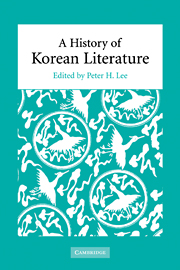Book contents
- Frontmatter
- Contents
- List of illustrations
- List of contributors
- Preface
- Note on the text
- Korean dynasties
- Glossary
- East Asia
- Principal places in works discussed
- Introduction
- 1 Language, forms, prosody, and themes
- 2 From oral to written literature
- 3 Hyangga
- 4 Silla writings in Chinese
- 5 Koryŏ songs
- 6 Koryŏ writings in Chinese
- 7 Early Chosŏn eulogies
- 8 Early Chosŏn sijo
- 9 Early Chosŏn kasa
- 10 Late Chosŏn sijo
- 11 Late Chosŏn kasa
- 12 Chosŏn poetry in Chinese
- 13 Chosŏn fiction in Chinese
- 14 Chosŏn fiction in Korean
- 15 P'ansori
- 16 Folk drama
- 17 Literary criticism
- 18 Early twentieth-century poetry
- 19 Early twentieth-century fiction by men
- 20 Early twentieth-century fiction by women
- 21 Late twentieth-century poetry by men
- 22 Late twentieth-century poetry by women
- 23 Late twentieth-century fiction by men
- 24 Late twentieth-century fiction by women
- 25 Literature of North Korea
- Bibliography
- Suggestions for further reading
- Index
20 - Early twentieth-century fiction by women
Published online by Cambridge University Press: 22 September 2009
- Frontmatter
- Contents
- List of illustrations
- List of contributors
- Preface
- Note on the text
- Korean dynasties
- Glossary
- East Asia
- Principal places in works discussed
- Introduction
- 1 Language, forms, prosody, and themes
- 2 From oral to written literature
- 3 Hyangga
- 4 Silla writings in Chinese
- 5 Koryŏ songs
- 6 Koryŏ writings in Chinese
- 7 Early Chosŏn eulogies
- 8 Early Chosŏn sijo
- 9 Early Chosŏn kasa
- 10 Late Chosŏn sijo
- 11 Late Chosŏn kasa
- 12 Chosŏn poetry in Chinese
- 13 Chosŏn fiction in Chinese
- 14 Chosŏn fiction in Korean
- 15 P'ansori
- 16 Folk drama
- 17 Literary criticism
- 18 Early twentieth-century poetry
- 19 Early twentieth-century fiction by men
- 20 Early twentieth-century fiction by women
- 21 Late twentieth-century poetry by men
- 22 Late twentieth-century poetry by women
- 23 Late twentieth-century fiction by men
- 24 Late twentieth-century fiction by women
- 25 Literature of North Korea
- Bibliography
- Suggestions for further reading
- Index
Summary
MODERN WOMEN WRITERS
The public act of publishing women's texts enables a concrete and viable point of departure for a historical interpretation of women's entrance into the modern history of Korean literature. Prior to the twentieth century, a woman writer composed her works largely within the space of her home. In the early twentieth century, however, Korean women writers began to appear in literary journals and women at large began making their appearance in social and public domains by taking advantage of the impetus for women's participation provided by the movements engaged in the enlightenment, modernization, and, ultimately, liberation of Korea.
Women's public participation, therefore, was initially spurred at the end of the nineteenth century by Korea's urgent need to maintain its independence, as it was caught in the web of becoming a colony of another nation. Enlightenment thinkers and, later, nationalists during the colonial period (1910–1945) sought to educate women in an effort to modernize Korea. In this sense, the fate of women writers was intrinsically tied to central social and national issues. Furthermore, the traditional framework of Confucian patriarchy transformed to a new form of patriarchy that demanded women be modern while still remaining within the strictures of the Confucian gender role. The modern gender role for women, then, meant continuing to carry out the duties of wise mother and good wife, maintaining some form of womanly virtues, while absorbing modern values. Women's texts portray the issues pertaining to social, cultural, and historical conflicts and dilemmas.
- Type
- Chapter
- Information
- A History of Korean Literature , pp. 406 - 419Publisher: Cambridge University PressPrint publication year: 2003



